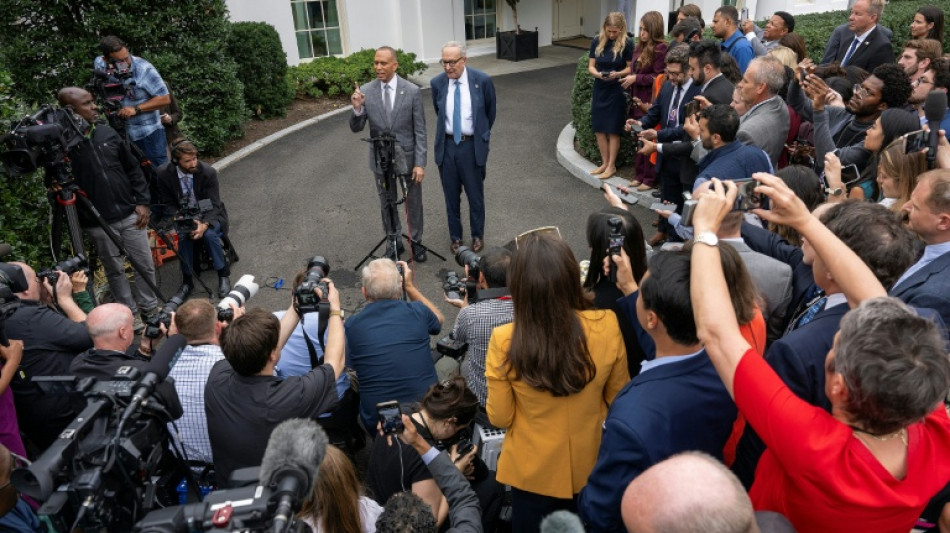
SCS
0.0200

A White House meeting on Monday with top Republican and Democratic congressional leaders yielded no budget breakthrough, with both sides trading blame less than 36 hours before government funding runs out.
"Large differences" remained between the two sides, top Senate Democrat Chuck Schumer told reporters after the last-gasp meeting hosted by President Donald Trump.
Schumer, whose party is in the minority, said "it's up to the Republicans whether they want a shutdown or not," adding that he had made "some proposals" to Trump.
Vice President JD Vance meanwhile accused the Democrats of putting "a gun to the American people's head" with their funding demands.
"I think we're headed to a shutdown because the Democrats won't do the right thing," he said.
Without Congress passing a bill to fund federal operations before midnight Tuesday night, the government will partially close up shop -- and plunge Washington into a new round of political crisis.
A shutdown would see non-essential operations grind to a halt, hundreds of thousands of civil servants temporarily left without pay, and payment of many social safety net benefits disrupted.
Such shutdowns are deeply unpopular in the United States, and Democrats and Republicans alike try to avoid the scenario -- while blaming the other camp should such a closure arise.
But with barely 36 hours to go before the deadline, each side is digging in its heels and the threat of a shutdown has swelled. The White House is upping the ante by threatening to fire large numbers of civil service workers, rather than the usual practice of simply holding up their pay until a deal is reached.
Republicans have proposed to extend current funding until late November, pending negotiations on a longer-term spending plan.
But Democrats, largely powerless and reeling from Trump's dismantling of entire government departments, are seeking to make use of their rare leverage.
- Healthcare demand -
Republicans hold narrow majorities in both chambers of Congress, but Senate rules require budget bills to receive 60 votes out of 100 to proceed -- meaning they must sway at least 7 Democrats.
Democrats want to see hundreds of billions of dollars in health-care spending restored, particularly in the Obamacare health insurance program for low-income households which the Trump administration plans to eliminate through its so-called "Big, Beautiful" budget bill passed in July.
They also want to block Trump and Republicans from later cutting approved funds through the so-called "recissions" process -- which requires only a simple majority to pass -- as they did this summer.
"Ultimately he's the decision maker," Schumer said of Trump. "And if he will accept some of the things we asked -- which we think the American people are for, on health care and on rescissions -- he can avoid a shutdown, but there are still large differences between us."
The House has already passed a short-term funding extension, and Republican House Speaker Mike Johnson has sought to force Senate Democrats' hands by not bringing his chamber back to Washington this week.
Johnson, speaking alongside Vance and Senate Republican leader John Thune, accused Democrats on Monday of "trying to bring in extraneous issues" instead of accepting his chamber's "clean" proposal to extend funding.
"If the Democrats make the decision to shut the government down, the consequences are on them, and I think it's absolutely tragic," he said.
The gridlocked Congress regularly runs into deadlines to agree on spending plans.
In March, with the threat of a shutdown already looming, Republicans refused to engage in dialogue with Democrats over massive budget cuts and the layoff of thousands of federal employees.
That time, 10 Senate Democrats, including Schumer, reluctantly voted for that Republican stop-gap measure to avoid a shutdown. But their decision angered the party base, which is calling on Democratic leaders to stand up to Trump.
O.Ruzicka--TPP